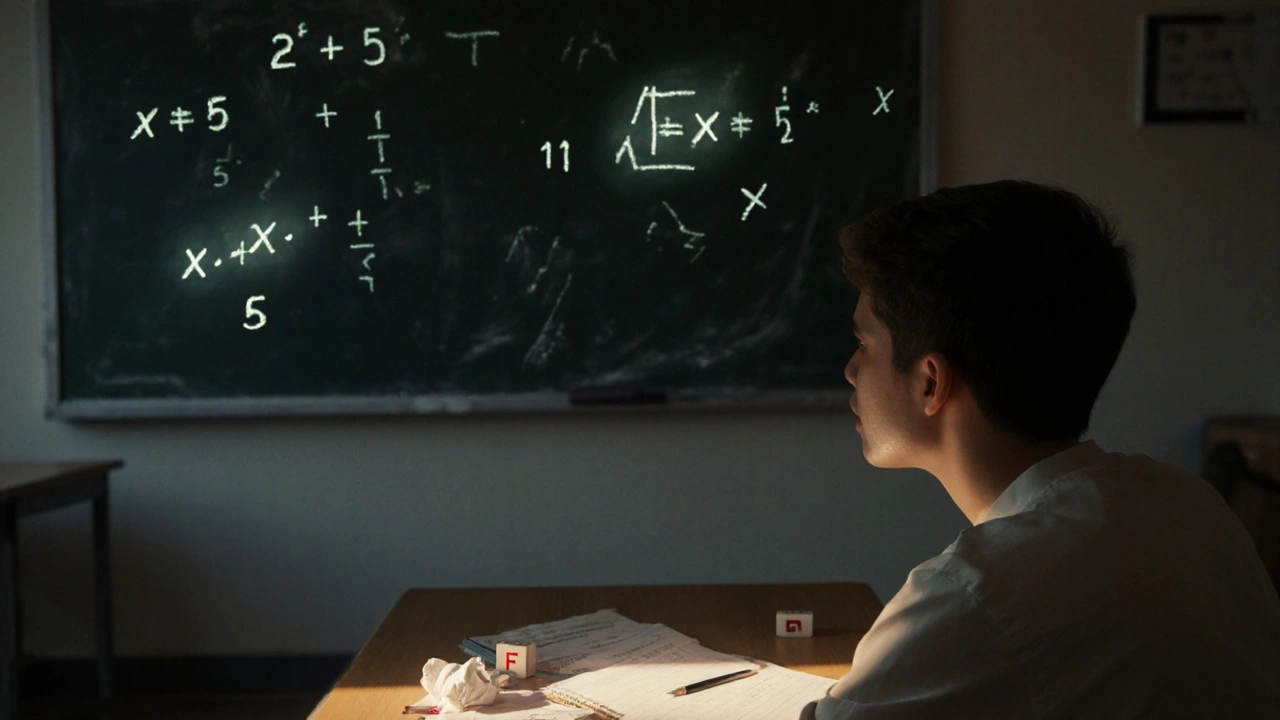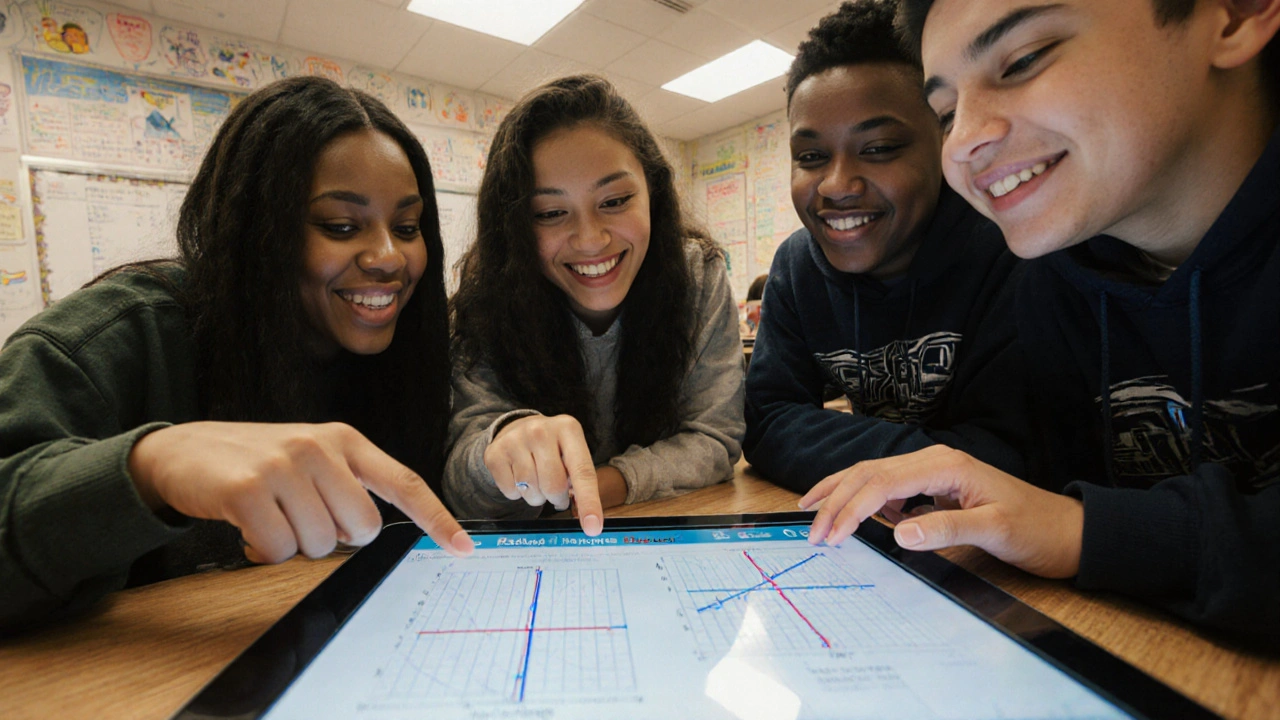What class do most high school students fail? The truth about algebra and why it trips up so many

More high school students fail algebra than any other single subject. It’s not because they’re lazy or bad at math. It’s because algebra is the first time school asks them to think differently - and most aren’t ready.
Why algebra is the most failed class
According to data from the U.S. Department of Education and state education reports across 40 states, between 20% and 35% of high school students fail Algebra I at least once. In some urban districts, the failure rate climbs above 40%. Compare that to biology, where failure rates hover around 12%, or English, where it’s closer to 10%. Algebra isn’t just hard - it’s a gatekeeper.
Students don’t fail because they can’t multiply or add. They fail because algebra forces a shift from concrete thinking to abstract reasoning. For the first time, they’re solving for x without knowing what x is. They’re told to treat letters like numbers - and that breaks their brain. A 2023 study from Stanford’s Graduate School of Education found that students who struggled with algebra had no trouble with arithmetic, but couldn’t make the leap from "what’s 5 plus 3?" to "what number plus 5 equals 8?"
When it hits: Freshman year
Most students take Algebra I in ninth grade. That’s no accident. Schools assume students are ready by then. But the reality? Many haven’t fully mastered fractions, negative numbers, or basic problem-solving skills from middle school. Teachers move fast. A typical Algebra I course covers 12 chapters in 180 days. That’s one chapter every 15 days - and some chapters take three weeks just to explain properly.
By week four, students are graphing linear equations. By week eight, they’re solving systems of equations with substitution and elimination. By week 12, they’re factoring quadratics. If you’re lost by week three, you’re behind for the rest of the year.
The hidden reasons students fall behind
It’s not just the math. It’s the way it’s taught.
- Too much memorization, not enough meaning. Students learn "FOIL" for multiplying binomials but don’t know why it works. They memorize the quadratic formula without understanding what the roots represent.
- No connection to real life. Textbooks use word problems about trains leaving stations at different times - things no one ever encounters. Students ask, "When will I ever use this?" and no one gives them a real answer.
- One-size-fits-all pacing. If you need three days to get it, you get one. If you need five, you’re labeled "slow."
And then there’s the confidence problem. A student who failed 6th-grade math gets placed in Algebra I anyway. They walk into class thinking, "I’m bad at math." That belief becomes a self-fulfilling prophecy. They stop trying. They don’t ask questions. They don’t do homework. By midterm, they’re already written off.

What actually helps students pass
Successful students don’t have better brains. They have better support.
Here’s what works, based on real classroom data from schools that cut algebra failure rates by half:
- Double-period algebra. Schools that give students 90 minutes a day instead of 45 see failure rates drop by 30-40%. More time means more practice, more questions, more chances to get it.
- Real-world applications. When students calculate the cost of a phone plan based on monthly fees and overage charges, or figure out how long it takes to save for a car, they start seeing algebra as a tool - not a puzzle.
- Visual tools. Using graph paper, algebra tiles, or apps that show how equations change when you tweak numbers helps students see patterns. One teacher in Denver replaced worksheets with interactive Desmos graphs. Pass rates jumped from 58% to 82% in one year.
- Peer tutoring. Students who tutor others in algebra are more likely to master it themselves. Schools that pair struggling students with trained peer tutors see 25% higher pass rates.
- Re-testing. Letting students retake quizzes and tests - not just once, but twice - reduces panic. It turns failure into feedback.
What parents can do
You don’t need to know algebra to help your child pass it.
- Ask, "What’s the one thing you didn’t get today?" Not "How was school?" That opens the door for real talk.
- Find free help. Khan Academy, PatrickJMT on YouTube, and the free math tutoring offered by many public libraries are all better than nothing.
- Don’t panic if they fail the first test. One low score doesn’t mean they’re doomed. It means they need a different approach.
- Encourage effort, not grades. Say, "I’m proud you kept trying," instead of "Why did you get a C?"

What schools should change
Most schools still treat algebra like a filter - if you can’t pass, you’re not college material. That’s outdated.
Some districts are moving to a "Math Pathways" model. Instead of forcing every student into Algebra I in ninth grade, they offer alternatives:
- Quantitative Reasoning - focuses on data, statistics, and real-life math for students not planning STEM careers.
- Integrated Math I - blends algebra, geometry, and statistics into one course, taught in context.
- Extended Algebra - a two-year version of Algebra I with built-in review and support.
These aren’t "easy outs." They’re smarter paths. Students in these programs are just as likely to go to college - and far more likely to graduate high school.
It’s not about being "good at math"
Algebra doesn’t measure intelligence. It measures preparation, patience, and support.
The student who fails algebra isn’t broken. The system is. We teach it like a mystery to be solved, not a skill to be built. We rush it. We judge it. We give up on kids too early.
But change is possible. Schools that treat algebra as a journey, not a gate, see more students succeed. Not because they’re smarter. Because they were given time, context, and a second chance.
If you’re a student struggling with algebra - you’re not alone. And you’re not behind. You just need the right way in.
Why is algebra the most failed class in high school?
Algebra is the first math class that requires abstract thinking - solving for unknowns, using symbols instead of numbers, and applying rules without clear real-world context. Most students haven’t fully mastered foundational skills like fractions, negative numbers, and problem-solving from middle school, so they hit a wall when the pace quickens in ninth grade. Teaching methods that focus on memorization over understanding make it worse. Data shows 20-35% of students fail Algebra I, making it the most failed single subject in U.S. high schools.
Is algebra harder than calculus?
For most students, yes - algebra is harder than calculus. Calculus builds on algebra, so if you understand algebra, calculus feels like a natural extension. But algebra is the first time students are asked to think symbolically, not just numerically. That mental shift is what trips people up. Many students who struggle with algebra go on to ace calculus after getting the right support. The problem isn’t complexity - it’s timing and foundation.
Can you pass high school without passing algebra?
It depends on your state. Most states require Algebra I for graduation, but some now offer alternatives like Quantitative Reasoning, Integrated Math, or Statistics-based courses. These are designed for students not planning STEM careers and still meet graduation requirements. Schools are moving away from forcing everyone through the same math path because it’s clear that one-size-fits-all doesn’t work. Check your state’s Department of Education website for approved alternatives.
What’s the best way to study for algebra?
The best way is to focus on understanding, not memorizing. Use visual tools like graph paper or apps like Desmos to see how equations change. Practice with real-life examples - like budgeting, comparing phone plans, or calculating discounts. Work with a tutor or study group. Don’t wait until the test to ask questions - ask them the day you’re confused. And if you fail a quiz, use it as feedback, not a verdict. Retakes and practice matter more than perfect scores.
Does failing algebra mean you can’t go to college?
No. Failing algebra once doesn’t close the door to college. Many students retake the course over the summer, online, or in a later year. Colleges care more about whether you showed improvement and persistence than whether you passed on the first try. Some community colleges even let you take remedial math while enrolled in other classes. The key is to keep trying - not to get it right the first time.
John Fox
November 27, 2025 AT 15:31Algebra just hits different when you’re 14 and your brain hasn’t caught up yet. I failed it twice and somehow ended up in engineering. Doesn’t mean I got it right the first time, just that someone finally explained it like I wasn’t stupid.
Tasha Hernandez
November 28, 2025 AT 12:41Oh sweet mercy this is the same reason I failed chemistry in 11th. They throw you into the deep end and act like you should’ve been born with a calculator in your hand. Meanwhile, my teacher spent 3 weeks on the quadratic formula like it was scripture and never once said what it actually does. I’m not lazy, I’m just not a mind reader.
Victoria Kingsbury
November 28, 2025 AT 16:20There’s a cognitive development gap here that’s being ignored. Piaget’s formal operational stage doesn’t kick in uniformly at 14 - many kids are still in concrete operational thinking when they’re shoved into algebra. The curriculum assumes universal readiness, but neurodevelopment isn’t on a schedule. Schools need to assess readiness, not just age. And yes, visual tools like algebra tiles and Desmos are not ‘nice to haves’ - they’re neurological bridges.
Also, peer tutoring works because explaining a concept to someone else forces your brain to restructure the knowledge - it’s called the protégé effect. This isn’t fluff, it’s cognitive science.
Tonya Trottman
November 30, 2025 AT 12:44Ugh. I swear every time someone says ‘algebra is hard’ they’re really saying ‘I didn’t do my homework’ and now they wanna blame the system. FOIL isn’t magic, it’s distributive property. Quadratic formula? Derive it once, it makes sense. But nooo, let’s just make the whole class easier so nobody feels bad. We’re dumbing down math because kids can’t sit still for 45 minutes. Pathetic.
Also, ‘when will I use this?’ - you use it when you’re trying to figure out if your rent is affordable based on your salary and taxes. Or when you’re calculating compound interest on a loan. But sure, let’s replace it with ‘quantitative reasoning’ so you can still be broke but feel good about it.
Rocky Wyatt
December 2, 2025 AT 07:13My cousin failed algebra 3 times. Got placed in a ‘math pathways’ class last year. Passed with a B. Now she’s in community college, majoring in graphic design. She’s happier. She’s not failing anymore. And she still knows how to calculate a tip. Who cares if she didn’t factor a quadratic? The system failed her, not her.
Santhosh Santhosh
December 3, 2025 AT 07:14In India, we also face this, but differently. We are forced to memorize everything - quadratic formula, identities, formulas for everything - and then tested on speed. No one ever explains why. I remember sitting in class, copying notes like a robot, and still not understanding what ‘x’ really meant. It was like learning a language without ever hearing it spoken. The moment I saw a graph of y = 2x + 3 changing in real time on a tablet, something clicked. Not because I was smart. Because I finally saw it work. That’s what schools miss. They teach symbols, not meaning.
Veera Mavalwala
December 4, 2025 AT 13:20Let me tell you something - algebra isn’t the problem. It’s the teachers. Half of them don’t even like math. They’re just there because they couldn’t get a job teaching anything else. They drone on about ‘slope’ like it’s a religious doctrine and then act shocked when kids zone out. I had one teacher who said, ‘If you don’t get it, you’re just not cut out for it.’ That’s not teaching. That’s surrender. And now we wonder why kids hate math?
Ray Htoo
December 6, 2025 AT 10:48Man, I love how this post breaks it down. I used to tutor algebra at the library and the biggest lightbulb moment for kids was when we stopped talking about ‘x’ and started talking about ‘the mystery number.’ Suddenly, it wasn’t some abstract ghost - it was just something we didn’t know yet. And when we used phone plans or pizza deals? Boom. They got it. No worksheets needed. Just real life.
Also, peer tutoring? My best student was the one who started tutoring others. He went from failing to acing it. Teaching it is the ultimate test of understanding.
Natasha Madison
December 7, 2025 AT 09:25This is all part of the globalist education agenda. They want to dumb down math so kids don’t learn critical thinking. Why? So they can’t question the system. Algebra is the last bastion of real logic. Replace it with ‘quantitative reasoning’? That’s just code for ‘let’s teach them how to consume data instead of analyze it.’ Wake up. This isn’t pedagogy. It’s control.
Sheila Alston
December 7, 2025 AT 22:53Parents are the real problem. You let your kid skip homework, then you cry when they fail. You don’t check their grades, you don’t ask questions, you just say ‘oh sweetie, it’s okay’ - and then you’re shocked they’re behind. You wouldn’t let them skip reading, so why let them skip math? It’s not about the system. It’s about responsibility. And if you don’t care enough to help, don’t be surprised when they fall.
sampa Karjee
December 8, 2025 AT 19:16How can you even compare Western education with ours? In India, we have 12 hours of math per week by 8th grade. We solve 50 problems a night. We memorize proofs before breakfast. And yet, you Americans act like algebra is some cosmic mystery. You don’t fail because you’re unprepared - you fail because you’re lazy. No discipline. No rigor. No respect for the subject. No wonder your system collapses.
Patrick Sieber
December 9, 2025 AT 20:08My brother failed algebra twice. Third time, they gave him a double period. He passed with an A. No magic. Just time. The idea that you can cram abstract thinking into 45 minutes is absurd. It’s like trying to teach someone to swim in a puddle. You need space to splash around. And yeah, Desmos? Game changer. I’ve seen kids who couldn’t graph a line suddenly light up because they could drag the slope and watch it change. That’s not luck. That’s good teaching.
Kieran Danagher
December 11, 2025 AT 05:49My dad said ‘if you can’t do algebra, you’ll never be able to balance your checkbook.’ I thought he was being dramatic. Turns out he was right. I’m 32, still use algebra to figure out if I can afford a new phone on a payment plan. It’s not about being a mathematician. It’s about not getting screwed by corporations who count on you not knowing how to solve for x.
OONAGH Ffrench
December 11, 2025 AT 14:33It’s not about failing algebra. It’s about failing to recognize that learning is not linear. We treat education like a factory line - put the student in, crank the knob, wait for the output. But minds don’t work that way. Some need time. Some need visuals. Some need to fail once to understand. The system doesn’t allow for that. It punishes slowness. That’s not education. That’s sorting.
poonam upadhyay
December 11, 2025 AT 19:33And yet… the same people who say ‘algebra is too hard’ are the ones who want their kids to go to college… but won’t help them study… and then blame the teachers… and then cry when they get rejected… and then say ‘education is broken’… but never change anything… and then wonder why their kid is working at Walmart… and then say ‘I did everything I could’… well… no… you didn’t… you just watched Netflix while your kid cried over homework…